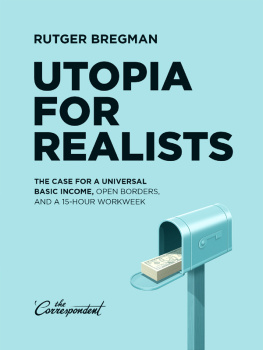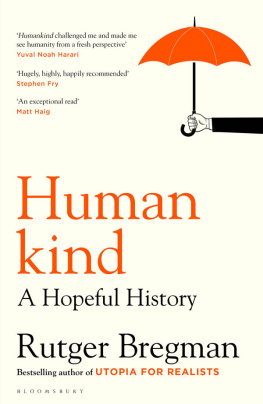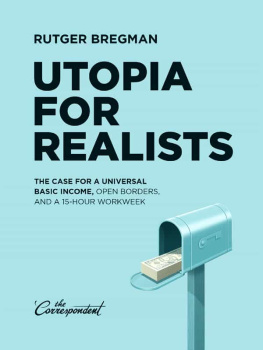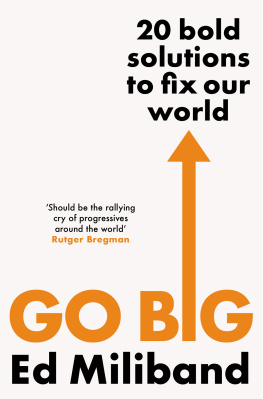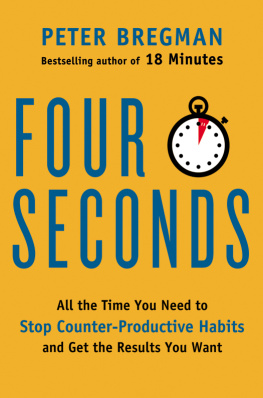Rutger Bregman - Utopia for Realists
Here you can read online Rutger Bregman - Utopia for Realists full text of the book (entire story) in english for free. Download pdf and epub, get meaning, cover and reviews about this ebook. year: 2016, publisher: The Correspondent, genre: Science / Politics. Description of the work, (preface) as well as reviews are available. Best literature library LitArk.com created for fans of good reading and offers a wide selection of genres:
Romance novel
Science fiction
Adventure
Detective
Science
History
Home and family
Prose
Art
Politics
Computer
Non-fiction
Religion
Business
Children
Humor
Choose a favorite category and find really read worthwhile books. Enjoy immersion in the world of imagination, feel the emotions of the characters or learn something new for yourself, make an fascinating discovery.
- Book:Utopia for Realists
- Author:
- Publisher:The Correspondent
- Genre:
- Year:2016
- Rating:5 / 5
- Favourites:Add to favourites
- Your mark:
- 100
- 1
- 2
- 3
- 4
- 5
Utopia for Realists: summary, description and annotation
We offer to read an annotation, description, summary or preface (depends on what the author of the book "Utopia for Realists" wrote himself). If you haven't found the necessary information about the book — write in the comments, we will try to find it.
Utopia for Realists — read online for free the complete book (whole text) full work
Below is the text of the book, divided by pages. System saving the place of the last page read, allows you to conveniently read the book "Utopia for Realists" online for free, without having to search again every time where you left off. Put a bookmark, and you can go to the page where you finished reading at any time.
Font size:
Interval:
Bookmark:
Praise for Utopia for Realists
Brilliant, comprehensive, truly enlightening, and eminently readable. Obligatory reading for everyone worried about the wrongs of present-day society and wishing to contribute to their cure. Zygmunt Bauman, one of the worlds most eminent social theorists, author of more than 50 books
If youre bored with hackneyed debates, decades-old right-wing and left-wing clichs, you may enjoy the bold thinking, fresh ideas, lively prose, and evidence-based arguments in Utopia for Realists.Steven Pinker, Johnstone Professor of Psychology, Harvard University, and author of The Blank Slate and The Better Angels of Our Nature
This book is brilliant. Everyone should read it. Bregman shows us weve been looking at the world inside out. Turned right way out we suddenly see fundamentally new ways forward. If we can get enough people to read this book, the world will start to become a better place. Richard Wilkinson, co-author of The Spirit Level: Why More Equal Societies Almost Always Do Better
Rutger Bregman makes a compelling case for Universal Basic Income with a wealth of data and rooted in a keen understanding of the political and intellectual history of capitalism. He shows the many ways in which human progress has turned a Utopia into a Eutopia a positive future that we can achieve with the right policies. Albert Wenger, entrepreneur and partner at Union Square Ventures, early backers of Twitter, Tumblr, Foursquare, Etsy, and Kickstarter
Learning from history and from up-to-date social science can shatter crippling illusions. It can turn allegedly utopian proposals into plain common sense. It can enable us to face the future with unprecedented enthusiasm. To see how, read this superbly written, upbeat, insightful book. Philippe van Parijs, Harvard University professor and cofounder of the Basic Income Earth Network
A wonderful call to utopian thinking around incomes and the workweek, and a welcome antidote to the pessimism surrounding robots taking our jobs. Charles Kenny, senior fellow at the Center for Global Development and author of The Upside of Down: Why the Rise of the Rest is Great for the West
A bold call for utopian thinking and a world without work something needed more than ever in an era of defeatism and lack of ambition. Highly recommended! Nick Srnicek, co-author of Inventing the Future: Postcapitalism and a World Without Work
The impact of this book in the Netherlands has been huge. Not only did Rutger Bregman launch a highly successful and long-running debate in the media, he also inspired a movement across the country that is putting his ideas into practice. Now its time for the rest of the world. Joris Luyendijk, bestselling author of Swimming with Sharks: My Journey into the World of the Bankers
Rutger Bregman writes with an exceptional voice. He shows both deep knowledge of the history and technical aspects of Basic Income and the ability to discuss it in a way that is meaningful and captivating even to people who are completely new to the topic. Karl Widerquist, Associate Professor at SFS-Qatar, Georgetown University, and co-chair of the Basic Income Earth Network
Utopia for Realists is an important book, a wonderfully readable breath of fresh air, a window thrown open to a better future. As politicians and economists are asking how to increase productivity, ensure full employment, and downsize government, Bregman asks: What actually makes life worth living and how can we get there? The answers, it turns out, are already there, and Bregman combines deep research with wit, challenging us to think anew about how we want to live and who we want to be. Required reading. Philipp Blom, historian and author of The Vertigo Years. Change and Culture in the West, 1900-1914 and A Wicked Company. The Forgotten Radicalism of the European Enlightenment
If energy, enthusiasm and aphorism could make the world better, then Rutger Bregmans book would do it. Even in translation from the Dutch, the writing is powerful and fluent a boisterously good read. The Independent
Utopia for Realists
2016 The Correspondent
Cover Design by Harald Dunnink and Martijn van Dam (Momkai)
English Translation by Elizabeth Manton
Author Illustration by Cla Dieudonn
Infographics by Momkai
Layout Design by Pre Press Media Groep
ISBN 978 90 822 5639 0
Original title Gratis geld voor iedereen: en nog vijf grote ideen die de wereld kunnen veranderen
Contents
A map of the world that does not include Utopia is not worth even glancing at, for it leaves out the one country at which Humanity is always landing. And when Humanity lands there, it looks out, and, seeing a better country, sets sail. Progress is the realization of Utopias.
OSCAR WILDE (18541900)
The Return of Utopia
Lets start with a little history lesson:
In the past, everything was worse.
For roughly 99% of the worlds history, 99% of humanity was poor, hungry, dirty, afraid, stupid, sick, and ugly. As recently as the 17th century, the French philosopher Blaise Pascal (16231662) described life as one giant vale of tears. Humanity is great, he wrote, because it knows itself to be wretched. In Britain, fellow philosopher Thomas Hobbes (15881679) concurred that human life was basically nasty, brutish, and short.
But in the last 200 years, all of that has changed. In just a fraction of the time that our species has clocked on this planet, billions of us are suddenly rich, well nourished, clean, safe, smart, healthy, and occasionally even beautiful. Where 94% of the worlds population still lived in extreme poverty in 1820, by 1981 that percentage had dropped to 44%, and now, just a few decades later, it is under 10%.
If this trend holds, the extreme poverty that has been an abiding feature of life will soon be eradicated for good. Even those we still call poor will enjoy an abundance unprecedented in world history. In the country where I live, the Netherlands, a homeless person receiving public assistance today has more to spend than the average Dutch person in 1950, and four times more than people in Hollands glorious Golden Age, when the country still ruled the seven seas.
For centuries, time all but stood still. Obviously, there was plenty to fill the history books, but life wasnt exactly getting better. If you were to put an Italian peasant from 1300 in a time machine and drop him in 1870s Tuscany he wouldnt notice much of a difference.
Two centuries of stupendous progress
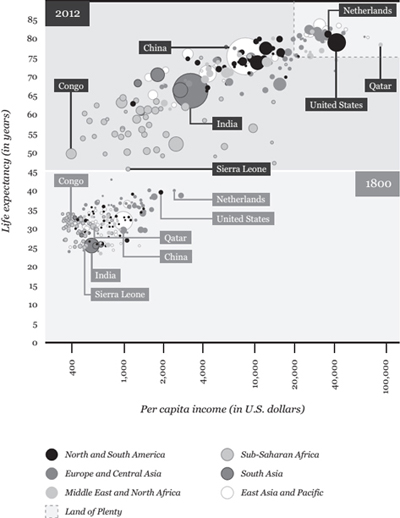
This is a diagram that takes a moment to absorb. Each circle represents a country. The bigger the circle, the bigger the population. The bottom section shows countries in the year 1800; the top shows them in 2012. In 1800, life expectancy in even the richest countries (e.g. the Netherlands, the United States) still fell short of that in the country with the lowest health rating (Sierra Leone) in 2012. In other words: in 1800, all countries were poor in both wealth and health, whereas today, even sub-Saharan Africa outperforms the most affluent countries of 1800 (despite the fact that incomes in the Congo have hardly changed in the last 200 years). Indeed, ever more countries are arriving in the Land of Plenty, at the top right of the diagram, where the average income now tops $20,000 and life expectancy is over 75.
Source: Gapminder.org
Six hundred years of civilization, and the average Italian was pretty much where hed always been.
It was not until about 1880, right around the time Alexander Graham Bell invented the telephone, Thomas Edison patented his lightbulb, Carl Benz was tinkering with his first car, and Josephine Cochrane was ruminating on what may just be the most brilliant idea ever the dishwasher that our Italian peasant got swept up in the march of progress. And what a wild ride it has been. The past two centuries have seen explosive growth both in population and prosperity worldwide. Per capita income is now ten times what it was in 1850. The average Italian is 15 times as wealthy as in 1880. And the global economy? It is now 250 times what it was before the Industrial Revolution when nearly everyone, everywhere was still poor, hungry, dirty, afraid, stupid, sick, and ugly.
Next pageFont size:
Interval:
Bookmark:
Similar books «Utopia for Realists»
Look at similar books to Utopia for Realists. We have selected literature similar in name and meaning in the hope of providing readers with more options to find new, interesting, not yet read works.
Discussion, reviews of the book Utopia for Realists and just readers' own opinions. Leave your comments, write what you think about the work, its meaning or the main characters. Specify what exactly you liked and what you didn't like, and why you think so.

